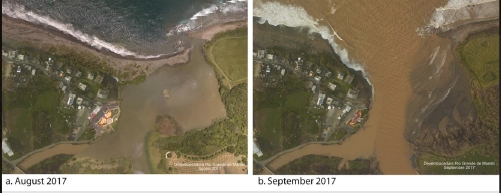Event: FRIDAY SEMINAR: "No es lo mismo llamar al diablo que verlo venir”: Climate Change, Changing Weather and Archaeological Heritage as Seen from Puerto Rico
Event Details

BIO:
Isabel Rivera-Collazo is Assistant Professor on Biological, Ecological and Human Adaptations to Climate Change at the Department of Anthropology and the Scripps Institution of Oceanography at UC San Diego. Dr. Rivera-Collazo is an environmental archaeologist specializing on geoarchaeology, archaeomalacology, coastal and marine processes, maritime culture and climate change, with regional interests in Puerto Rico, the Caribbean Basin and the Neotropics (Pan Caribbean region); Israel and the eastern Mediterranean. Her research focuses on the effect that human activity has over island ecosystems through time, as well as how have people responded to climatic and environmental change in the past. Dr. Rivera-Collazo’s work focuses on resilience and adaptation, investigating what decisions enhance or reduce adaptive success. Taking an applied approach, Dr. Rivera-Collazo also works with local communities in the quest for understanding the current and expected impacts of climate change, including threats to coastal heritage. Dr. Isabel Rivera-Collazo has a MSc degree on Palaeoecology of Human Societies and a PhD on Environmental Archaeology both from the Institute of Archaeology,University College London. She is also Research Fellow of the Center of Tropical Ecology and Conservation (CATEC) and the Laboratory of Environmental Archaeology at the University of Puerto Rico, Rio Piedras Campus.
ABSTRACT:
A popular proverb in Puerto Rico warns that “it is not the same thing to call the devil than to see him come”. For many years, scientists have been warning about the potential impacts of climate change. In the last five to ten years archaeologists have been linking those impacts to heritage. These past two years, 2017 and 2018, have demonstrated the real-life meaning of changing weather – which eventually will add up to changed climate – and it is not the same to see the devil come. In the context of rapidly changing weather, heritage is a tool for adaptation, for recovery of lost knowledge, and for communication of locally relevant climate science. But at the same time, this reality puts heritage professionals at the front of a social, physical and cultural disaster that is simply overwhelming. This presentation will share the experiences of working with archaeological heritage and climate change research in Puerto Rico before, during and after a record-breaking catastrophic year of hurricanes and winter storms, and will contextualize the work of archaeology in the practicality of equity and justice from within the communities themselves.


